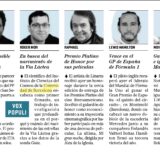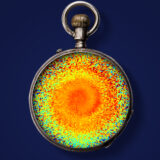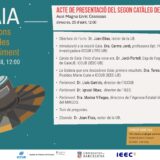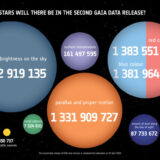Roger Mor: En busca del nacimiento de la Vía Láctea (El Mundo, 13/05/2019)
ROGER MOR En busca del nacimiento de la Vía Láctea (El Mundo) El científico del Instituto de Ciencias del Cosmos de la Universidad de Barcelona encabeza como primer firmante, un trabajo de investigación que profundiza en el porqué y cuándo del nacimiento de las estrellas de la Vía Láctea gracias a los datos de la sonda Gaia.
read moreUn inesperado ‘baby boom’ de estrellas en la Vía Láctea (El Mundo, 13 Mayo 2019)
Un inesperado ‘baby boom’ de estrellas en la Vía Láctea Científicos de Barcelona descubren que buena parte de los astros de la galaxia nacieron en una época en la que quedaba poco gas. El choque con otra galaxia pudo haber reactivado su formación Date: 13 Mayo 2017 Media: El Mundo Link to the new: https://www.elmundo.es/ciencia-y-salud/ciencia/2019/05/13/5cd7140bfc6c83be238b477e.html La historia de una estrella es una historia convulsa. Como la de las galaxias en las que viven. Y gracias a una nave espacial que está estudiando más de mil millones de astros los científicos están...
read moreJordi Torra i Roca, Barcelona, 23/04/1949 – 26/02/2019
Ph.D. in Physics by the Universitat de Barcelona (1984) and Professor in the Department of Quantum Physics and Astrophysics in the same University, he focused his research career in the study of the structure, formation and evolution of our Galaxy, the Milky Way. He was one of the pioneers at European level in the development of the field of Astrometry from Space. In the 80s he accepted the challenge to lead the Spanish participation in the European Space Agency’s Hipparcos mission and, as a result from this work, Spain is fully participating in the Gaia mission, launched in 2013 and...
read moreGaia detects a shake in the Milky Way
Image: The spiral shape of fig 1c of our article appears inside an old watch symbolising the fact that these data has allowed us to date back the perturbation that shook the Milky Way disk. This figure shows how from the new obtained Gaia data we can know more about the past of the Galaxy. Credit: Edmon de Haro/iStock. Researchers of the UB and the University of Groningen lead one of the first big discoveries from the Gaia Mission, published in Nature A team led by researchers from the Institute of Cosmos Sciences of the University of Barcelona (ICCUB, UB-IEEC) and the...
read moreGaia Second Data Release Event in Barcelona.
[UPDATED] See the event video here or at our YouTube channel On Wednesday 25 April 2018, the European Space Agency (ESA) publish the second data release of the Gaia mission. The team of researchers from the Universitat de Barcelona (ICCUB/IEEC) organises an event open to the general public in the Faculty of Physics (Av. Diagonal 647, Barcelona) where the new data will be presented and the new era in astronomy that it begins will be described. Gaia: a billion stars in movement Gaia Second Data Release Event Aula Magna Enric Casasses, Facultad de Física, Universitat de Barcelona Wednesday 25...
read moreOpening of the Gaia Archive
A media briefing is being organised by ESA at the ILA Berlin Air and Space Show in Germany, on Wednesday 25 April 2018. You can find all the information about the event organized around the opening of the Gaia Archive in the link below, as well as the streaming info. The opening will take place at 12:00h. http://www.esa.int/Our_Activities/Space_Science/Gaia/Call_for_media_Second_data_release_from_ESA_s_Gaia_mission
read more










